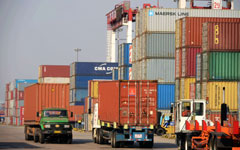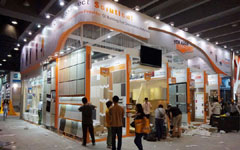In the past five years, Guangdong reported negative trade growth only in 2009, a year after the global financial crisis.
In 2013, Guangdong's import and export value increased by 10.9 percent from a year earlier to $1.09 trillion, according to a provincial government work report.
Guangdong will strive to increase domestic consumption by promoting Guangdong-made products across the country and will continue to optimize investment structure this year, according to the report.
 |
 |
 |
"The trade structure is improving and a growing number of exporters have turned to innovation-driven trade," Lin says.
In sharp contrast to the processing trade, which reported a 22.6 percent decline year-on-year, Guangdong's general trade in the first three months increased by 13.9 percent year-on-year to 550 billion yuan.
Manufacturers in the Pearl River Delta, a major manufacturing and trade hub in Guangdong, also expect a bleak trade outlook in the months ahead.
Zeng Zhaoyang, a manager at the trade department at Guangdong Hopeful Electric Co, says the company reported a loss both in export value and business profits in the first quarter of the year.
"The fast export growth in the 1990s is long gone. Now we are struggling," Zeng says.
The company, a home appliance maker based in Foshan, Guangdong, reported a 10 percent year-on-year drop in exports last year, according to Zeng.
Stiff competition and increased labor and production costs have also squeezed business profits in recent years, Zeng says.
"We have to boost research and design investment and develop more product varieties for overseas markets so that we can stay profitable," he says.
A total of 2,000 exporters in Guangdong surveyed in a recent report by the Shenzhen-based Onetouch Business Service Co reported an export increase of only 1.44 percent year-on-year in the first three months of 2014.
However, Zhu Xiaodan, governor of Guangdong, said during the annual local legislative meeting in January that the province would maintain stable trade growth this year by introducing a series of measures to encourage local companies to better tap the international market.
"We will develop varieties of international markets, support local exporters to participate in overseas trade events, cultivate more overseas sales channels and carry out cross-border e-commerce for sustainable trade growth," Zhu says.
